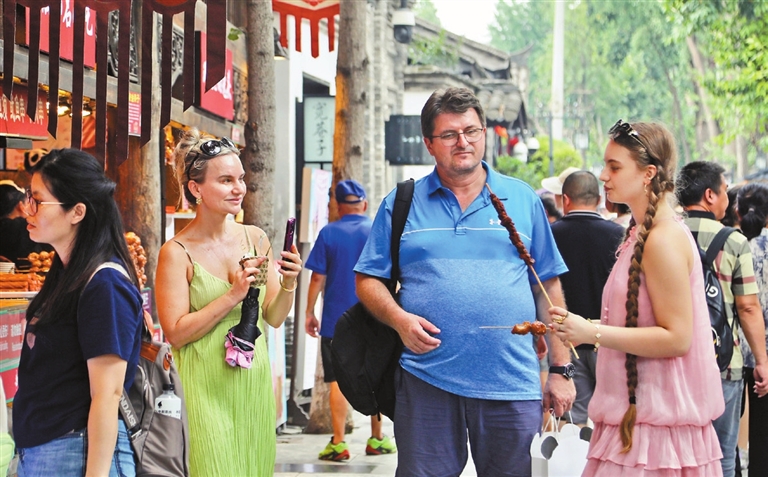



THE 12th World Games in Chengdu, southwestern China’s Sichuan Province, was not only a spectacular display of athletic prowess but also a powerful catalyst for local economies, driving growth of sports and event-related consumption. Sports-related passion on the uptick The World Games has thrust once-fringe sports into the spotlight, sparking a surge in public participation and spending. Among them, power surfing — making its debut as part of the motorboat events at this year’s Games — has emerged as a standout, blending speed and excitement to captivate audiences in Chengdu. This high-octane water sport, which uses fuel-powered surfboards for high-speed racing, combines elements of surfing and skiing, making it a spectator favorite with universal appeal across genders. China’s delegation of eight athletes underscores the nation’s growing focus and enthusiasm for this emerging sport. “Representing China in such a rapidly developing sport is an honor,” said Chinese competitor Zhang Maozhu. Other once-niche sports are also gaining traction. Squash, set to debut at the 2028 Olympics, is similarly booming. Attending her first squash event, a 15-year-old high schooler surnamed Luo was so captivated she posted about it on social media. “Friends immediately messaged: ‘Let’s book a court this afternoon,’” she laughed, noting its unique rules feel “like nothing else.” Sports industry expert Zhang Qing echoed the sentiment. He noted that hosting international events like the World Games isn’t just about competition — it’s about exposing the public to new and trendy sports, which directly fuels demand for training, equipment, and venues. “These are tangible business opportunities for the entire supply chain in the related sports sector,” he said. Beyond the Games, Chengdu is ensuring that the passion endures. Drawing on experience from the FISU World University Games, seven temporary venues built for the World Games will be retained for public use post-event, supporting the creation of “sports+” consumption scenarios citywide. Statistics highlight growing public engagement in sports, fueled by local government initiatives like the “World Games Sports into Communities” campaign. Having extended its reach to over 600 communities, the program has drawn more than 120,000 residents into active participation, fostering a vibrant culture of grassroots sports. In the meantime, 120 schools across the city have embraced World Games disciplines such as lacrosse, frisbee, and squash, integrating these dynamic sports into daily education and youth development. A variety of sports originating from different countries and regions can now be seen near Kuanzhai Alley and along the banks of the Jinjiang River. Wang Yi, director of the Chengdu municipal bureau of sports, said that Chengdu is expected to host over 80 high-level international and national sports events this year, with the total scale of sports consumption projected to reach 80 billion yuan (US$11.21 billion) and the total scale of the sports industry expected to exceed 150 billion yuan. Influx of global visitors boosts tourism The 2025 Chengdu World Games have triggered an influx of global visitors, acting as a powerful catalyst for the city’s travel and tourism sector. This surge, driven by international athletes, spectators, and curious travelers, has underscored the event’s role in elevating Chengdu’s appeal as a tourist destination. Aviation statistics tell the story of this global rush. As of Tuesday, Chengdu’s aviation port had seen over 3.846 million inbound and outbound trips this year, an 11.5% year-on-year increase, ranking first among aviation ports in central and western China. Of the figure, over 928,000 were made by foreigners — up 56.7% from a year earlier. Even before the Games kicked off, the summer travel rush saw more than 140,000 cross-border trips made by foreigners, a 48.93% surge. For these global visitors, Chengdu has delivered memorable experiences marked by convenience and warmth. A delegation of U.S. athletes, fresh from exploring a local market in Jinjiang District, shared their impressions. Trost Alexis, a coach with the International Cheer Union, highlighted the ease of navigating daily life. “Alipay was really easy. I researched it before coming.” She also lauded the hospitality of locals. “The lady working at the market was so nice and helped us. Even when we couldn’t communicate, people would always take out their phones to translate. It’s really nice.” Such positive interactions have sparked a deeper desire to explore. Trost Sheila, another member of the U.S. delegation, pulled out her phone to look up Taikoo Li — a downtown CBD area recommended by the reporter — saying, “We’d love to explore more about the city.” Chengdu has rolled out a suite of measures to cater to international travelers. Over 65,000 local merchants accept foreign card payments, 21 overseas e-wallets are directly usable, and 427 duty-free stores plus 103 “instant refund” shops simplify souvenir shopping. Transportation, too, has been streamlined. Holders of overseas bank cards can access public transit, and multi-language navigation systems are fully deployed at A-level scenic spots, airports, and subway hubs. Chengdu’s pioneering “ticket stub economy” turns event tickets into consumption catalysts, experts observed. During the Games, scenic spots like the Giant Panda Breeding Base and Wuhou Temple offer free entry for athletes and 50% off for holders of Games tickets. “This taps into people’s desire for value, boosting retail, dining, and tourism while extending stays,” Zhang noted, calling it a first for international events. Douyin data show the number of Chengdu-themed videos on the platform exceeded 3.36 million since July, up 104.2% year on year, and group-buy transactions for food, entertainment, and leisure in Chengdu increased 50.8% from a year earlier. Foreign athletes embrace local culture During the World Games, foreign athletes are immersing themselves in Chinese culture and the vibrant atmosphere of the city. “I want to see the giant panda and also learn more about local culture,” said Indian wushu sanda player Namrata Batra. Batra has been practicing wushu since 2015 and is now exploring the cultural roots behind the sport. “I have heard that Sichuan’s Qingcheng Mountain area is famous for wushu, and I hope to get the chance to learn more moves there,” she said. In the women’s 52-kilogram wushu sanda event, Batra won a silver medal, marking India’s first-ever podium finish in wushu at the World Games. “The level of wushu across the world is improving, and the competition is becoming increasingly close,” said Zhang Yuping, secretary-general of the International Wushu Federation. “This shows that wushu has entered a new stage, with more people around the world taking part.” Beyond competition, foreign athletes are taking part in cultural experiences such as Sichuan Opera face-changing, sugar painting, and Chinese calligraphy. “I love Chinese dishes, especially Sichuan food. They are super delicious,” said José Perurena, president of the International World Games Association. Chengdu’s modern development has also left an impression. “I could really feel the city’s energy while walking through the bustling Chunxi Road commercial district and Taikoo Li,” said Ida May Hudson, a member of Canada’s national floorball team. She and her teammates arrived early, visiting exhibitions, attending fairs, and trying on hanfu, traditional Chinese clothing. “The World Games is not only a major sports event but also a platform for international exchanges,” said Yin Jian, director of Chengdu’s municipal center for promoting opening-up and cooperation. “Chengdu is fully showcasing its openness and vitality through this international event,” Yin said. Athletes have also been impressed by the technological innovation. During the Games, China-developed robots for patrolling, retail, and delivery were deployed to support event services. “The use of these robots has enhanced the athletes’ experience and created more opportunities for our products,” said Zeng Qi, chief technology officer of Eventec, a Chengdu-based technology company. Another highlight are smart glasses, which are capable of real-time translation in over 40 languages and have attracted widespread interest among athletes. “The Games provide an excellent platform for innovative companies like us, bringing in more opportunities for cross-border cooperation and international expansion,” said Liu Yu of Sichuan INMO Technology Co. Ltd., the developer of the glasses.(Xinhua) | 
